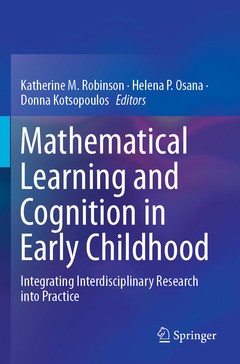Description
Mathematical Learning and Cognition in Early Childhood, 1st ed. 2019
Integrating Interdisciplinary Research into Practice
Coordinators: Robinson Katherine M., Osana Helena P., Kotsopoulos Donna
Language: English
Subjects for Mathematical Learning and Cognition in Early Childhood:
Keywords
Assessment of mathematical learning during early childhood; Cognition and mathematical development in early childhood; Commercial mathematics instruction programs for young children; Counting procedures and principles in early childhood; Development of mathematical cognition in early childhood; Early intervention for children with mathematical difficulties; Home numeracy environment; Language and mathematics in early childhood; Mathematical skill development at home; Mathematical skill development in early childhood; Mathematics education in early childhood; Mathematics education in preschool and kindergarten; Mathematics instructional approaches in elementary school; Neuroscience of mathematical cognitive development; Numeracy skills in early childhood; Parenting and mathematics education; Role of parents in children’s mathematical development; Schema-based instruction for young children; Spatial skills in early childhood; Young children and mathematical development
Publication date: 08-2020
274 p. · 15.5x23.5 cm · Paperback
Publication date: 05-2019
274 p. · 15.5x23.5 cm · Hardback
Description
/li>Contents
/li>Biography
/li>Comment
/li>
This book explores mathematical learning and cognition in early childhood from interdisciplinary perspectives, including developmental psychology, neuroscience, cognitive psychology, and education. It examines how infants and young children develop numerical and mathematical skills, why some children struggle to acquire basic abilities, and how parents, caregivers, and early childhood educators can promote early mathematical development. The first section of the book focuses on infancy and toddlerhood with a particular emphasis on the home environment and how parents can foster early mathematical skills to prepare their children for formal schooling. The second section examines topics in preschool and kindergarten, such as the development of counting procedures and principles, the use of mathematics manipulatives in instruction, and the impacts of early intervention. The final part of the book focuses on particular instructional approaches in the elementary school years, such as different additive concepts, schema-based instruction, and methods of division. Chapters analyze the ways children learn to think about, work with, and master the language of mathematical concepts, as well as provide effective approaches to screening and intervention.
Included among the topics:
- The relationship between early gender differences and future mathematical learning and participation.
- The connection between mathematical and computational thinking.
- Patterning abilities in young children.
- Supporting children with learning difficulties and intellectual disabilities.
- The effectiveness of tablets as elementary mathematics education tools.
Mathematical Learning and Cognition in Early Childhood is an essential resource for researchers, graduate students, and professionals in infancy and early childhood development, child and school psychology, neuroscience, mathematics education, educational psychology, and social work.
Section I: Infancy and Preschool.- Chapter 1. Early Mathematical Minds: Interdisciplinary Perspectives on Early Mathematical Learning and Cognition.- Chapter 2. The “Girl Crisis”: The Relationship between Early Gender Differences and Future Mathematical Learning and Participation.- Chapter 3. Spatial Learning and Play with Technology: How Parental Spatial Talk Differs Across Contexts.- Chapter 4. Supporting Mathematics Play in Home Environments: A Feasibility Examination of a Take-Home Bag Intervention.- Section II: The Beginnings of Formal Schooling.- Chapter 5. Early Identification of, and Interventions for, Kindergarten Students at Risk for Mathematics Difficulties.- Chapter 6. Mathematical or Computational Thinking: An Early Years Perspective.- Chapter 7. Supporting Meaningful Use of Manipulative in Kindergarten: The Role of Dual Representation in Early Mathematics.- Chapter 8. Kindergarteners and First-Graders’ Development of Numbers Representing Length and Area: Stories on Measurement.- Chapter 9. Young Children’s Patterning Competencies and Mathematical Development: A Review.- Section III: The Elementary School Years.- Chapter 10. Arithmetic Concepts in the Early School Years.- Chapter 11. An Integrated Approach to Mathematics and Language Theory and Pedagogy.- Chapter 12. Schema Based Instruction: Supporting Children with Learning Difficulties and Intellectual Disabilities.- Chapter 13. Tablets as Elementary Mathematics Education Tools: Are They Effective and Why.- Chapter 14. Early Understanding of Fractions via Early Understanding of Proportion and Division.
Integrates research from developmental and cognitive psychology, neuroscience, and education
Explores parents’ role in infant and toddler mathematical development
Compares instructional approaches from first through fourth grades
Discusses research on typically developing children and those with learning disabilities or at risk of failing mathematics
Examines effectiveness of commercial mathematics instruction programs




